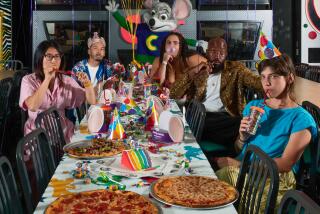Woody Allen’s maturity problem
Several months ago, I watched Woody Allen’s 1979 film “Manhattan” for the first time since I was in my 20s and for perhaps the 10th time total.
“He adored New York City,” Allen’s character, Isaac Davis, says in voice-over in the opening lines. “He idolized it all out of proportion.”
Once upon a time, I idolized this movie all out of proportion. Though I was too young to see it when it was first released, I became obsessed with its Gershwin soundtrack and black-and-white, wide-screen cinematography in high school, right around the time I began romanticizing some mythic notion of becoming a New York sophisticate.
And in my mind, no one was more sophisticated than the high-strung, Sontagian journalist played by Diane Keaton, who dates a married Columbia professor named Yale before she falls for Isaac.
What could be better than wandering around the Guggenheim on weekends and dining at Elaine’s and casually mentioning that Mahler is totally overrated? To me, these weren’t just characters, they were templates for my future self. They were the exact opposite of suburban teenagers like me. This was a movie for and about the kind of grown-up I wanted to be.
But when I saw it this last time, I was only a few minutes into it before I began feeling embarrassed for my younger self. The dialogue I’d practically memorized in my youth now made me cringe in places. Sparkling though it was, Allen’s efforts to poke fun at the pretensions of urban intellectuals were far less subtle than I’d remembered.
Keaton’s character pronounced Van Gogh “Van Gock.” She used terms like “textural” and “negative capability” and sounded like a first-year art student rather than a seasoned journalist. Allen’s signature ticks and stammers made his performance more cartoonish than nerdy cool.
I suddenly realized I’d had everything backward. These characters were not sophisticated as much as they were expressions of what a young, relatively naive person imagines sophistication to be. This was not a movie for adults but for precocious teenagers. Teenagers a little like the 17-year-old in the movie, Tracy, who, in a storyline that would foreshadow Allen’s life, was 42-year-old Isaac’s other girlfriend.
Seventeen was the age I was when my enthusiasm for “Manhattan” probably reached its peak. Even so, I was too busy idolizing Keaton’s character to think much about whether statutory rape was a factor between Tracy and Isaac. But watching the film today, I was struck not just by the creepiness of that relationship but also by the utter nonchalance with which the film’s other characters greeted it.
“I don’t think she’s too young,” says Yale’s earnest, seemingly sensible wife as they arrive home from a double date in which Isaac’s girlfriend has announced that she has homework to do. Even Keaton’s character, a feminist erupting with opinions, essentially regards Isaac’s relationship with the girl as an endearing quirk.
Granted, attitudes about sexual power dynamics were different in 1979. It’s telling that most reviews of “Manhattan” saw the relationship as titillating — even funny — rather than abusive. Still, Allen, realist (albeit sometimes magical realist) auteur though he’s purported to be, has always been more the mastermind of his own peculiar fantasy genre, one in which struggling artists live in multimillion-dollar lofts, people use terms like “negative capability” while keeping a straight face, and middle-aged male nebbishes are irresistible to women of all ages.
Given those motifs — and given the degree to which they’ve become more exaggerated over the course of his career — you could argue that the adolescent energy Allen brought to early films like “Bananas” and “Take the Money and Run” never really matured into a bona fide adult sensibility. There’s a perverse logic, then, to his fixation on teenage girls. He’s in many ways still a teenager himself.
I’m not going to dip my toe too far into the roiling waters stirred up by Allen’s daughter’s statement Sunday that he sexually abused her as a child. There are already far more opinions floating around than facts. But I do think there’s something to be said for the ways in which the scandal forces his fans, particularly fans of “classics” such as “Manhattan,” to take a hard look at what it was we found so captivating about the worlds he created.
Whatever it was I thought “Manhattan” explained and promised, whatever it was I thought I wanted, it was clearly out of proportion to what was actually there.
Twitter: @meghan_daum
More to Read
A cure for the common opinion
Get thought-provoking perspectives with our weekly newsletter.
You may occasionally receive promotional content from the Los Angeles Times.











